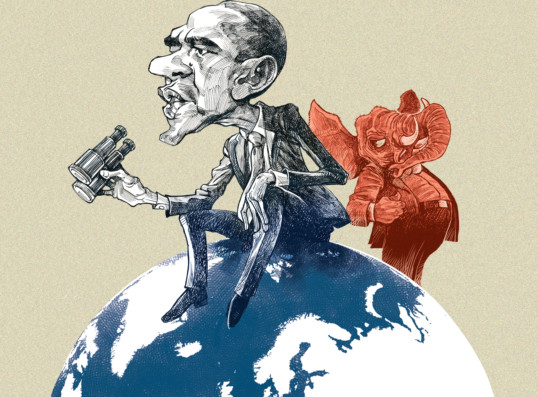
When US President Barack Obama gave his state of the union address to Congress and the nation two weeks ago the question on the minds of the political class was how he planned to deal with the new reality.
For the first time in his presidency Obama faced a legislature controlled by the Republicans. Pre-speech conventional wisdom held that this situation called for humility: an appeal to bi-partisanship and a promise to work with his opponents to get things done. There were, indeed, some pro-forma nods to reaching across the aisle. Obama reminded his listeners that in the 2004 speech that launched his national political career he spoke of a country that was neither a Red (Republican) America nor a Blue (Democratic) America but the United States of America.
Then he more or less read Republicans the Riot Act. He reminded them that though Congress may be filled with Republicans, their agenda can’t become law without his signature. He then promised to veto much of the Republican agenda and called for a list of things (free university tuition, a higher minimum wage, new taxes on the very rich, guaranteed paid sick leave for workers) that he called “practical, not partisan” and that he well knows few, if any, Republicans will support. The website Politico, arguably Washington’s best real-time gauge of conventional wisdom, called the speech “a progressive’s dream of Obama unfettered from earlier centrist leanings and flirtations with ‘grand bargains’ with Republicans”.
The foreign policy sections of the speech broke little new ground but in the context of the broader speech they did raise several interesting questions. Here, too, a new assertiveness seemed to be on the agenda. Its clearest example so far has been Cuba, where Obama recently used executive orders to sweep away large parts of the 50-year-old US boycott of the island. If the domestic policy portions of the speech threatened Republicans with presidential vetoes, the foreign policy section was filled with reminders that on many issues Obama does not require their approval.
To cite the most obvious Middle East-focused example, Obama called on Congress to give him formal authorisation to use force against Daesh (Islamic State of Iraq and the Levant). Of course, the US and its allies have been using force against Daesh for many months — dropping bombs in Iraq and Syria, training the Iraqi army, funding Syrian rebel groups, etc. Since lack of Congressional authorisation for any of this has not stopped the administration so far, it is unclear what, exactly, a Congressional resolution now would change (beyond the political calculation of forcing Congressmen and Senators to vote on this conflict one way or the other).
Above the political fray
In the coming months, the question is whether this newly assertive president will begin to channel his energies mainly into foreign affairs. To some extent this is natural: Obama would hardly be the first American leader to focus on the judgement of future historians now that he no longer has to worry about the judgement of future voters. Foreign policy offers American presidents easy opportunities to appear statesmanlike and above the political fray, as Obama’s post-State of the Union trip to India and Saudi Arabia amply demonstrated.
But will assertive also mean aggressive? For the moment the answer appears to be ‘no’ or, at least, ‘not any more than it already does’. Some American troops are headed back to Iraq, more troops than most Americans realise are remaining in Afghanistan and Washington’s long post-9/11 fixation on security, counter-terrorism and drone warfare seems unlikely to change any time soon. Neither, however, does it appear likely to escalate. Troops may he headed back to Iraq but it is difficult to see their numbers rising very much. A president who still counts withdrawal from Iraq among his major accomplishments will do much to avoid military escalation.
Similarly, the entire point of the push for a nuclear agreement with Iran, which has clearly become one of the focal points of the waning years of this administration, is to keep America (and, by implication, Israel) out of a new war that Obama shows no desire to fight. I grant that it may not appear so benign when one is sitting in the Middle East and looking West, but from American shores it is difficult to look at Obama and not see a president weary of the Middle East; one who wishes the region would stop drawing his attention away from trade deals in Asia and reopening relations with Cuba.
Then again, trade agreements and a full end to the Cuban embargo require Congressional approval. Whatever its frustrations the Middle East remains a region where American presidents, for good or ill, remain able to act largely on their own. That alone guarantees that presidential attention and American activity, will never wane for very long.
Gordon Robison, a longtime Middle East journalist and US political analyst, teaches political science at the University of Vermont.












